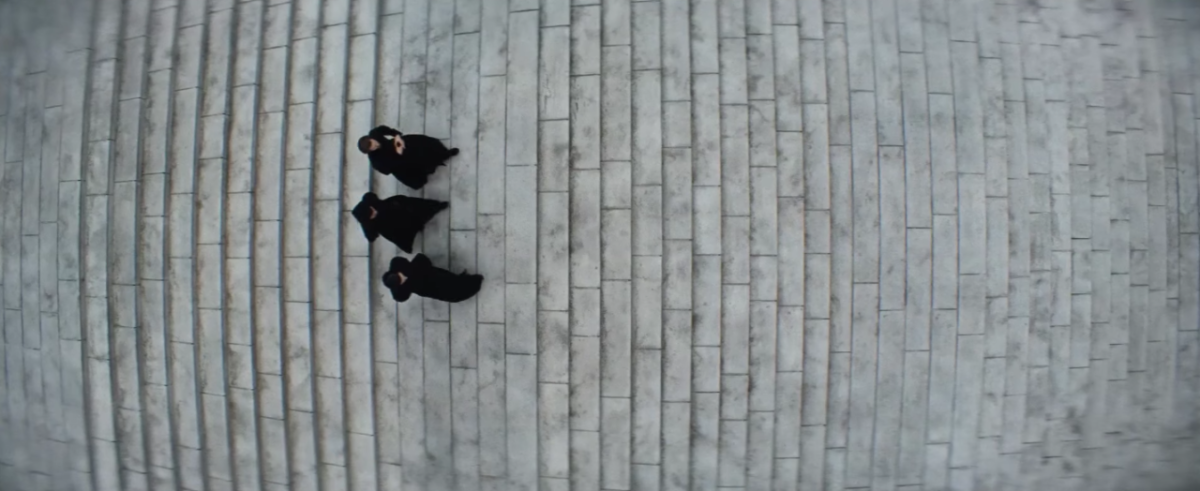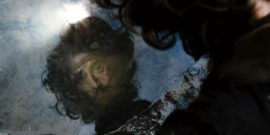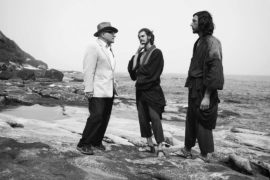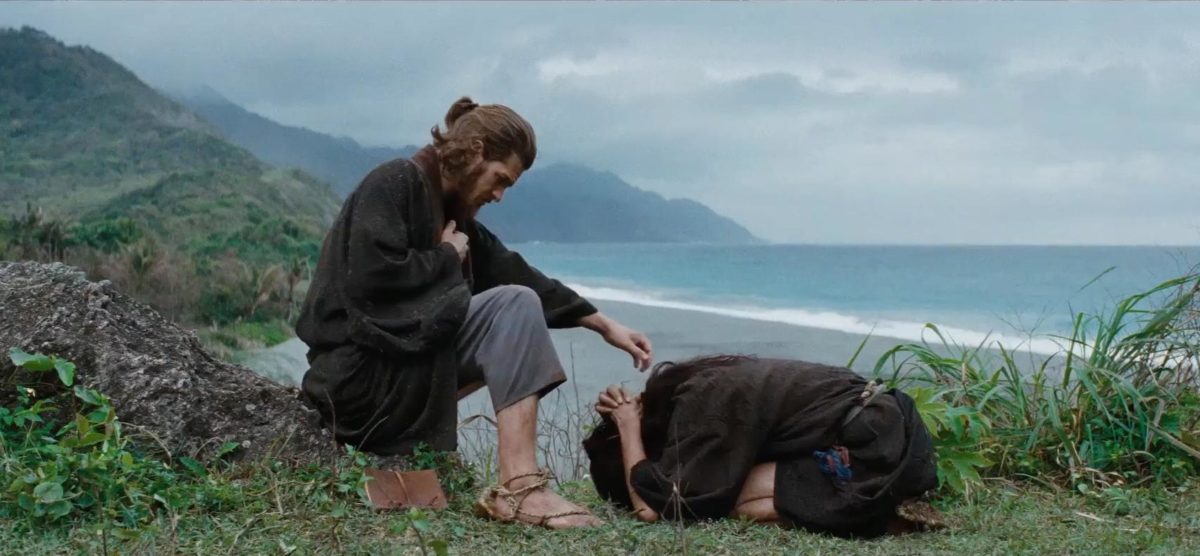Faith is a torment. It is like loving someone who is out there in the darkness but never appears, no matter how loudly you call. – The Knight in Ingmar Bergman’s ‘The Seventh Seal’ (1957)
Whether He (or She) exists or not is irrelevant. Fact is that God is man’s greatest creation and therefore thinking about God means thinking about man. For a time in which we believe to be secular, God has lately been on the agenda quite prominently and thus thinking about him has been even more important than ever before. So where are they, the great artists, the great philosophers, the great (wo)men who dare to eschew contemporary and fashionable religions like sociology and psychology in favour of taking up a tradition and cultural heritage of more than two thousand years that still lingers in our every move, our every thought and our every crisis? With his latest film, Scorsese takes up this challenge, redeeming himself of the bloated and all too easily zeitgeisty Sheep in Wolf’s Clothes of Wall Street, to ask those questions that are, as another great man once coined, untimely.
Knight of Despair
The story of Silence (2016) is a rather simple one: in the 17th century two Portuguese priests, Rodrigues (Andrew Garfield) and Garupe (Adam Driver), embark on a mission to search for their spiritual father, Father Ferreira (Liam Neeson). He was sent to Japan to teach the gospel but went missing after his last letter described the growing difficulties Christians had to endure in a country that had no ears for their message. We follow these Jesuit priests into the unknown where they initially meet a village of devout Christian farmers that leads them to utter the first big question of the movie: “How is it possible that their faith is so strong under such hard circumstances?”
It is easy to believe in God when your whole society has been created as a testimony to his existence. Priests are educated in these religious matters as if they are soldiers and the matter of faith is not really an existential but just an existing one. Their lives up until this point have been so easy and comfortable that there never has been any place or time for doubt. When Rodrigues and Garupe descend the steps of the Jesuit missionary base of St. Paul’s College in Portuguese Macau and set sail to Japan, we bid farewell to this structured and unambiguously meaningful world through a top shot that could be interpreted as being the comforting perspective of an all-seeing God. (This point of view shot is a remarkable trait of the filmmaker known for his constant reworking of the ‘original sin’-theme throughout his filmography: Alfred Hitchcock, as Scorsese himself notably mentions in the 2015 documentary Hitchcock/Truffaut.)

And yet doubt, as they will learn further on, is the root of all religion, the well wherefrom it springs. Just as the Knight from Bergman’s The Seventh Seal who returns from his crusade as a disillusioned man and demands proof of God’s existence, the priests will start to doubt their religion in a world that’s no longer bereft from suffering under the all-seeing eyes of a God that refuses to speak.
The first part of the movie focuses on the physical hardships of the Japanese villagers and the Jesuit priests that will lead to the despair that is necessary in any Bildung journey and certainly the kind which allows one to become what Søren Kierkegaard called a ‘Knight of Faith’. Shot against the backdrop of some of the most beautiful natural landscapes in recent cinematic history, the physical suffering is at the same time a way to place humans in nature itself and a way to isolate them from it, because nature is as indifferent to human suffering as God appears to be. When three Japanese villagers are crucified on the rocks at the edge of the ocean, the water smashes against their bodies until life has been beaten out of or drowned within them. One of the crucified sings a praising hymn to God’s glory but the water will not be sung away. This event is the catalyst for Father Rodrigues’ despair which will lead him to stray from the right path laid down by the Church and start his existential journey towards true religion that makes up the second half of the movie.
The Grand Inquisitor
The Inquisition of Christians in Japan is led by a man who is mentioned many times before he finally reveals his identity. He goes by the name of the Inquisitor and this immediately brings to mind the most famous chapter of Fjodor Dostoevsky’s final novel The Brothers Karamazov (1879–1880). This chapter, aptly titled ‘The Grand Inquisitor’, tells us the proposed story for a poetic treatment in verses by Ivan Karamazov (the man whose famous cry “Without God, everything is allowed!” echoed throughout the whole of Europe), wherein Jesus comes back to earth and gets imprisoned by the eponymous Inquisitor of the Church that is supposed to be founded on His teachings.
In His prison cell the Inquisitor holds a one-sided dialogue where nothing short of man’s free will is at stake. Forbidding Jesus to add anything to everything he’d already said sixteen centuries earlier, he tells him that the Church has corrected his teachings because it turns out man can’t handle the freedom the Son of God has made possible for him. Only Gods can follow in His footsteps and man is many things but no God. The Church has thus taken the burden of man’s freedom upon herself so the masses can be free instead of happy. And Jesus could only stand in their way.

The dichotomy that’s been made clear here is one between the Church and Jesus himself and this distinction lies at the basis of Father Rodrigues’ dilemma. Must he persist in defending the ecclesial doctrines or will he try to live in imitatio christi? Will he keep preaching or will he practice what he preaches?
Redemption Now
The search for a vanished, almost mythical person in a foreign country is a movie trope that’s been most famously executed in Francis Ford Coppola’s rightfully hailed masterpiece Apocalypse Now (1979). Set in Vietnam during the American war that ravaged the country in the 1960s, the film is based on the book Heart of Darkness (1899) by Joseph Conrad. As a Belgian, this novella hits close to home, because the story is based on the writer’s experiences as the captain of a steamboat that sailed under the flag of a Belgian trading company. He led the steamer up the Congo River and was mortified by the atrocities he witnessed there under European colonialism, which is also a theme in Silence.
When he is first taken captive by the Japanese, Father Rodrigues is told the story of another imprisoned priest, Father Cabral. The interrogators’ interpreter tells him this Father came to teach them but not only refused to learn anything himself (most importantly the Japanese language), he also despised almost anything about Japan. This might be described as colonialism 101. This stands in sharp contrast with the big reveal that Father Ferreira has indeed seemingly abandoned Christianity and works for the Inquisitor now. Not only has he learnt the Japanese language, he even took on the identity of a deceased Japanese man (and en passant his wife and kids too). Instead of going mad and proclaiming himself to be some sort of half God like the mythical colonel Kurtz in Conrad’s novella, Father Ferreira made the effort to learn about the culture he was supposed to save with his missionary mission and found out that the Japanese don’t need any saving, least of all by some foreign power with no real knowledge of their history, culture and overall existence.
No Church in the Wild
One of the main insights that started the (reversed) conversion of Father Ferreira was the fact that the Japanese name for the Christian God actually refers to nothing more than that almighty power in the sky: the sun. Instead of the son of God, the Japanese worship the sun that is God. This ‘nominal’ confusion is important because it shows a big difference between Japanese and European cultures and, as such, why Christianity is so alien to Japanese culture. Christianity, as a continuation of Jewish principles, starts with the story of the creation of the world by God and how man and woman are expelled from the Garden of Eden (a metonym for all of nature) because of the Original Sin. Christianity redeems mankind of its estrangement to nature by promising us the victory over our flesh, which will lead us to heaven, a place where there will be no more suffering.
This is far removed from the (in the film antagonistically positioned) Buddhist teachings that have a much more harmonic relationship with nature. Because of this harmony with nature and the cosmos, the people who live in a society based on Buddhist principles need no redemption from their physical being; their suffering means something completely different than the supposed significance it is given by the Catholic Church. Father Rodrigues is told that his faith in a Christian God is considered to be an illusion when viewed from a Buddhist point of view. To redeem himself (which is the deliberately wrong-chosen word here), he has to overcome his illusion to reach a higher state of spiritual being. Which after much trials and tribulations is exactly what will happen to Father Rodrigues.
The Silence of Martyrs

“Why hast thou forsaken me?” cries Father Rodrigues at the height (or depth) of his suffering, ostentatiously quoting one of Jesus’ final sayings at the cross. In another Ingmar Bergman film, Winter Light (1963), a protestant clergyman has his own spiritual crisis when he finds himself unable to provide the comfort one of his parishioners needs, resulting in the latter’s suicide. At the end of the movie, the organ player who has been physically suffering his whole life compares his pain to the pain of Jesus but unexpectedly comes to the conclusion that the real suffering of Christ was the “silence of God” when he was nailed at the cross. Jesus was never more human than when he, in the night leading up to his trial, pleaded God to “(if it is possible) [take] this cup […] from me.” God didn’t answer him nor did he answer him on the cross when he uttered that famous last saying. God became human to redeem us, but in order to do so he had to undergo the complete human experience, even including his own silence.
During the big climax of Silence, the long build-up to the apostasy of Father Rodrigues, we are treated to the voice of Jesus talking to the man who is about to betray him. To no one’s surprise, Jesus encourages him, gives him the strength to make that small step for man but giant leap for humanity. Right before this leap to faith Father Rodrigues utters the words: “In the silence I heard Your voice.” And this is the crux of the movie.
Even though Jesus doubted himself and his existential cry (which Bach translated into the profound “Erbarme dich!”) was met with silence, he nevertheless died for our sins. The silence of God manifests itself through the silence of man. It may never be an excuse not to act. With faith, just like with pudding, the ultimate proof is in the eating.
This apostasy which will lead to the saving of numerous human lives is a valuable sacrifice that stands in contrast to the general praxis of martyrdom that is a leitmotiv in this movie and the history of the Church. “The blood of martyrs is the seed of the Church,” says Father Rodrigues, and he is right, but something that benefits the Church doesn’t necessarily benefit its followers. Before the sacrifice of his ego, Father Rodrigues asks the Inquisitor a bigger challenge to prove his faith, unbeknownst to the fact that he is already being tested in the most poignant way. Rodrigues wants to prove he too can be a martyr; he needs the glory of martyrdom but, as the Inquisitor rightfully remarks, the price for his glory is the lives of others. His desire for martyrdom is a matter of ego, not of faith.
When Father Rodrigues finally apostatizes, thus abandoning the Church and sacrificing his ego, he becomes a Knight of Faith. He has learnt that true religion is not something easy and that truth, as he used to believe, is not something universal but these are two things that need to be practiced within a given context. He overcame his personal illusions and in this way finally took part in the tradition of the country that he so desperately wanted to save. By apostatizing his religion, he became a Buddhist and this was necessary for him to become a true Christian.
The Fool
Whatever happened to Kichijiro (Yōsuke Kubozuka)? First introduced to us as the reluctant guide for the two padres, he transforms himself (although transforming would presuppose ‘action’ from his part, which is not the case) into one of the most interesting and problematic characters of the movie. He is weak, cowardly and inadvertently mocks Father Rodrigues’ big climax by apostatizing like it is no bigger deal than changing one’s clothes. If he would have been consequently malevolent, we could see him as another antagonist for the spiritual journey of Father Rodrigues, but unfortunately we cannot put him away that easily, because the regret he ostentatiously shows for his sins and betrayals is sincere. In his opportunistic approach to religion and his surroundings Kichijiro is human, all too human, and interestingly embodies the same spiritual problems as the Father he betrays.

The Judas-motive has been in our culture for as long as we have artistically reflected upon the crucifixion. What to make of the man who loved Jesus and yet betrayed him for a small amount of silver, when historically he is known to have been wealthy before he decided to follow Jesus. What complicates the matter even more is that without Judas’ betrayal there would have been no Christianity whatsoever. There was nothing that elevated Jesus from the multiple other prophets during his life up until his spectacular death and resurrection that changed the course of history. In The Last Temptation of Christ (1988), Scorsese had already acknowledged this theorem by showing Judas as the only apostle who helps Jesus fulfil the prophecies.
Since every Jesus needs his Judas, Kichijiro deserves our consideration. Apart from the fact that without his betrayal Father Rodrigues would not get his climactic revelation, Kichijiro embodies (and I repeat this word with reason) the same doubt that will redeem Father Rodrigues. For Kichijiro, being a Christian has meant seeing his family burn to death, going in exile from his hostile home country and facing the constant despise of others for his open and unapologetic weakness. “Why do I have to live now, in these dangerous times, when hundred years ago I could have easily been a good Christian?” he asks angrily.
This question brings the matter of faith back to the act (out) of faith. Kichijiro is by no means a Holy Fool, the name given to those who give up their lives in favour of a complete devotion to their faith, but a Human Fool: a man who tries his best to believe in order to live. By being weak and opportunistic Kichijiro shows us, in a way that almost diminishes the apostasy of Father Rodrigues to spiritual masturbation, the truth of human existence, rooted in the vulnerable reality of the flesh in a hostile – or even worse, an indifferent – world, wherein faith could be something that makes us transcend this reality. But at what price? By betraying the principles of his faith, Kichijiro chooses life and shows us the truth which Father Rodrigues had to learn at the expense of others: that true faith can be beautiful but it is never easy.